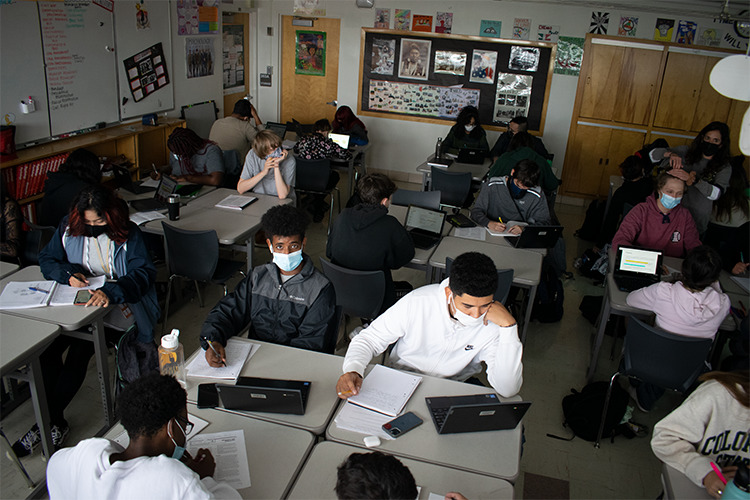
Students in Advisement learn about various skills they’ll need later in life, like time management and mindfulness. photo courtesy of the Yearbook staff
Advisement may be seen as one of the less important classes by some students, but in reality it is meant to help teach students crucial life skills and build peer connections.
Every Tuesday and Thursday after second period, students shuffle to their Advisement classes. While some students may be excited to connect with close peers, others may wonder why attendance is even required. Regardless of student opinion, Advisement is designed to boost their social and mental well-being and has had a meaningful impact on the TJ community.
Advisement was added to the daily schedule at the start of the 2020-21 school year when Denver Public Schools mandated social and emotional learning for high school students due to the difficulties of the COVID-19 pandemic. When students returned to in-person learning in 2021, some responded negatively to having Advisement at all and wanted the old system of office hours back. However, counselor and key creator of the Advisement curriculum, Jillian Gleason, explained that the district requires an Advisement class and that it “is a way to support students in academic, social, emotional, and college and career planning.”
Other feedback from students and staff is taken into consideration when creating the lessons. Each Advisement class chooses a representative to share feedback from the class with the Advisement planning team in regular meetings. Likewise, teachers take surveys about how the lessons are going in their classes. The Advisement planning team, made up of numerous teachers and support staff who teach multiple grade levels and subjects, meets monthly to discuss this feedback and make any necessary changes to future lessons. Not only do they use feedback on the lessons themselves, they also utilize data from teachers, student surveys, and district statistics to create lessons that are beneficial to students. For example, Gleason explained, “Students are really struggling with anxiety, [so] every Thursday [we include] five minute deep breathing or body scans.” It’s because of data like this, requirements from the district, and observations from counselors that the Advisement curriculum focuses so heavily on students’ mental health.
Not only does the team want students’ mental health to benefit from Advisement, they also want to teach students about topics important to growing up that aren’t taught in other classes. These topics include substance abuse, gender identity, emotional vulnerability, coping strategies, career planning, and teamwork. Besides these valuable lessons, Advisement is meant to be a community where students can get to know each other well and the teacher can support students in unique ways. Gleason hopes that students feel, “some sense of belonging, some type of little family unit where you get to have conversations about what people are struggling with.”
Social Studies teacher Garien Behling, who teaches Advisement to juniors, has seen Gleason’s vision in his Advisement class. He has noticed that being with the same group of their peers for more than a year has helped build connections. He remarked that, “Even in the course of one year, that community of 25 people really got to know each other a lot better and I could definitely tell that some people felt a lot more comfortable trying new things and sharing things.” Another change he has noted is the shift in curriculum to better fit students’ current grade level. Behling notes that with his junior class, he is “jumping in to talk about college readiness or career readiness even earlier than we did last year when they were sophomores.” However, he also knows that students have requests for what they would like to see from Advisement; namely, more academic time for them to do their homework or get help from peers and the teacher, which he thinks could be valuable.
As the ones being taught Advisement, students do want some changes to be made. Sophomore Advisement representative Amaris Medina notes that some students find Advisement to be pointless and she herself wishes the lessons focused more on what students want to learn. She wants her input as a student representative to be taken more seriously and to learn about topics that affect high schoolers, such as using social media in a healthy way and coping mechanisms for extreme stress. Medina thinks that if students could learn about topics they want to, they would be more engaged in the class. Nonetheless, she has still found the lessons to be helpful and engaging, such as the mindful minutes at the beginning of class helping her take a second to breathe and release her anxieties. Medina has also found a community in her Advisement class and said that, “We’re able to make the best out of the Advisement lessons that we might not be engaged in but we make it engaging because we have a strong connection.” While it still has room to grow, Advisement has undoubtedly brought TJ students closer together, and will continue to be a valuable asset to the school in the years to come.